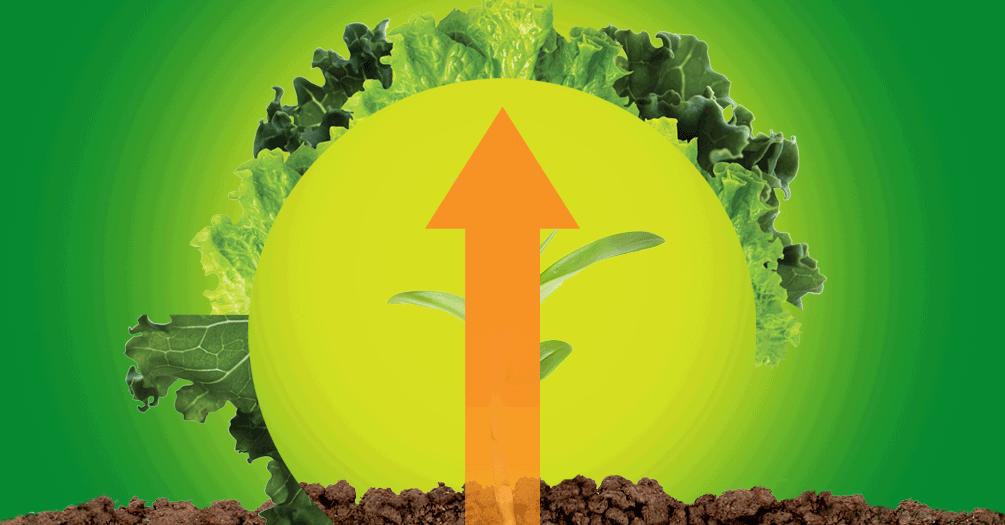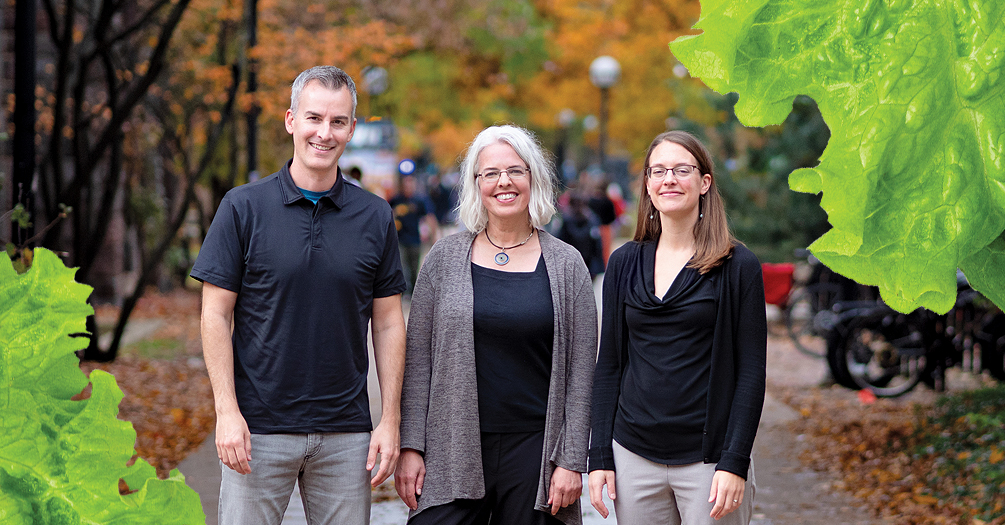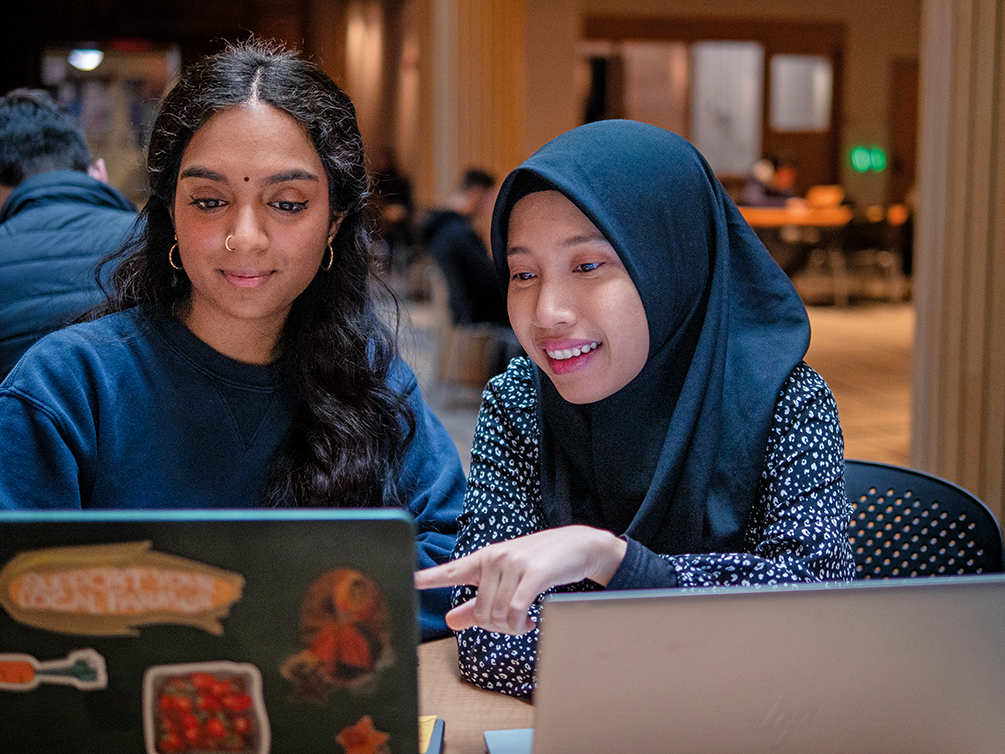Food systems synergy

Exploring sustainable food systems with an interdisciplinary approach
By Bob Cunningham
Graduate school work often focuses on the deeper understanding of a single topic or a single field. Other times, a subject demands a more extensive approach.
For instance, take sustainable food systems and their interconnectedness to biology, environmental science, ecology, urban planning, food policy, epidemiology and human nutrition. One subject. Many connections.
The introductory course Foundations of Sustainable Food Systems explores the complexities and nuances of this topic, offering students all across the University of Michigan the ability to explore some of the interrelationships between core concepts within a food system, looking through the lenses of public health, environmental sustainability and the food policy process.
It underscores the value of cross-disciplinary cooperation among students and faculty within the university.
The class is taught by Andy Jones, associate professor of Nutritional Sciences at the University of Michigan School of Public Health, and faculty from the School for Environment and Sustainability (SEAS) and from the Urban and Regional Planning Program (URP) within the Taubman College of Architecture and Urban Planning: Jennifer Blesh and Lesli Hoey, respectively. The three faculty members have been collaborators since they first met at Cornell University when they were earning their doctoral degrees.
“I certainly couldn’t teach this class by myself,” said Jones, who has been instructing the class for nine years. “If I were teaching a food systems class, I would have to narrow the scope of it, for sure, because I can’t teach about soil science like Dr. Blesh can or speak to policy advocacy like Dr. Hoey.
“Our collaboration really is a unique opportunity for us to bring our different skill sets, experience and knowledge to bear and not just to talk about our strengths in a siloed way, but to think about how these different issues intersect.”

US Farm Bill’s impact on food sustainability
A prime example of how their expertise comes into play is teaching the class about the US Farm Bill and how nutrition, the environment and policy all play major roles.
Through the Farm Bill, the US manages agricultural and food-related concerns with different initiatives such as aid for nutrition, crop protection, commodity backing and preservation. The legislative foundation for the regulations and policies within the agricultural and food sector is typically updated roughly every five years.
“A popular narrative links farm income subsidies, specifically for large-scale agribusinesses growing corn for high-fructose corn syrup, to the obesity problem in the US,” Jones said. “The actual evidence suggests that these subsidies play a negligible role in influencing food prices and dietary choices leading to obesity. The impact of subsidies on obesity is minor compared to numerous other causes, despite a common presumption that subsidies for crops used in sweeteners contribute significantly to obesity.
“While subsidies might have other negative effects, such as environmental impacts, their effects on obesity appear to be minimal. It’s essential to examine the evidence and approach the issue with nuance rather than accepting presupposed logic.”
Today’s food systems are highly unsustainable—at least the dominant industrial food system, Blesh said.
“In part, because we’ve moved toward highly simplified production systems that have lost a lot of species diversity in space and time,” she said. “And that means that crop production now depends on a lot of fossil fuel-based inputs instead of ecological processes. And so by definition, that can’t continue indefinitely.
“We have major challenges in terms of thinking about how we continue food production into the future. Currently, we’re doing it in a way that’s harming the environment and depleting the resources that we need to grow food.”
RELATED CONTENT
- Q&A with Andy Jones: From volunteering in the Peace Corps to navigating sustainable food systems, food policy
Examining food systems’ interconnectivity
Jones said the majority of the course is imparting their individual expertise to the students, but about a third of the class is bringing that knowledge together to understand how each discipline affects the other: “How the science of soil and what’s being grown on farms could have impacts on diets or how food policy has brought impacts upon the environment, diets and on equity.
“I think there’s no way to really discuss and get to the practical, lived experience of most people in the food system without talking about the intersection of many of these issues.”
There is no single sector—public health, urban planning or sustainability—that can address all the issues related to food systems alone, Hoey said.
“For students who chart out careers in food systems, we hope our class helps them apply a critical systems lens to their work. At a minimum, we hope others will put on a food systems lens so that they recognize the unintended impact their particular sector might have on food systems equity or sustainability. Without that lens, for instance, planners won’t pay attention to the growth of cities and preserve really critical farmland; we’re going to keep losing our smaller scaled and most diversified farms.”
I think there’s no way to really discuss and get to the practical, lived experience of most people in the food system without talking about the intersection of many of these issues.”
— Andy Jones
It’s not just faculty who offer a broad range of knowledge of food systems. The students also add richness to the class by bringing their perspectives and ideologies to the conversation.
“We have students from the Ross School of Business who might be interning at large food firms, learning about food market dynamics and strategies,” Jones said. “There are also students who possess a completely different approach toward the food industry and large corporations, like those in the Environmental Justice track in SEAS.”
The aim is to facilitate discussions among such distinct student groups, encouraging them to share their contrasting viewpoints. These interactions are expected to be respectful, based on factual evidence, and help participants understand and appreciate other perspectives, often resulting in a softening of their rigid beliefs.
“The eventual disagreements are acceptable, provided they recognize their common objectives and deliberate on the various available paths toward reaching them, including understanding the trade-offs involved,” Jones said. “To me, that’s the great value of a course like this. I have not been a part of any other courses in my time at Michigan Public Health that are quite like this—that’s why it’s so fun to teach.”

‘Understanding importance of collaborative efforts’
Sai Cheruvu and Lala Sri Fadila are two students from the Fall 2023 class who appreciated the interdisciplinary nature.
Cheruvua, who earned a bachelor’s degree in public health at the University of Texas at Austin, is a first-year student from SEAS studying Geospatial Data Science and is interested in researching sustainable agriculture.
The Sustainable Food Systems class expanded my understanding of the importance of collaborative efforts in transforming food systems. Through the collaboration of professors from diverse fields and the participation of students from various programs, I gained a holistic perspective on the complexities of our food systems.
— Lala Sri Fadilla
“It was a fantastic class because it brought together all of my interests for one goal,” she said. “I really enjoyed the public health perspective brought by Dr. Jones and the soil science and ecosystems knowledge shared by Dr. Blesh. The urban planning perspective shared by Dr. Hoey helped contextualize the impact of sustainable food systems.
“My specific interest is in farmer and farmworker livelihood in India. Being able to take this course and understand the local and global implications of my work has been instrumental in motivating me to find new avenues in how farmworkers are linked to the more extensive food system.”
Fadila, a Fulbright Scholar from Indonesia, is a second-year MPH student in the Nutritional Sciences program at Michigan Public Health.
“The Sustainable Food Systems class expanded my understanding of the importance of collaborative efforts in transforming food systems,” she said. “Through the collaboration of professors from diverse fields and the participation of students from various programs, I gained a holistic perspective on the complexities of our food systems.
“As a nutrition student, exploring food systems through lenses such as agriculture, urban planning, economics and development is invaluable. I appreciated the opportunity to discuss topics such as climate-smart agriculture and carbon-neutral cities in this class as it highlighted the interconnectedness of various disciplines in addressing food-related challenges.”
